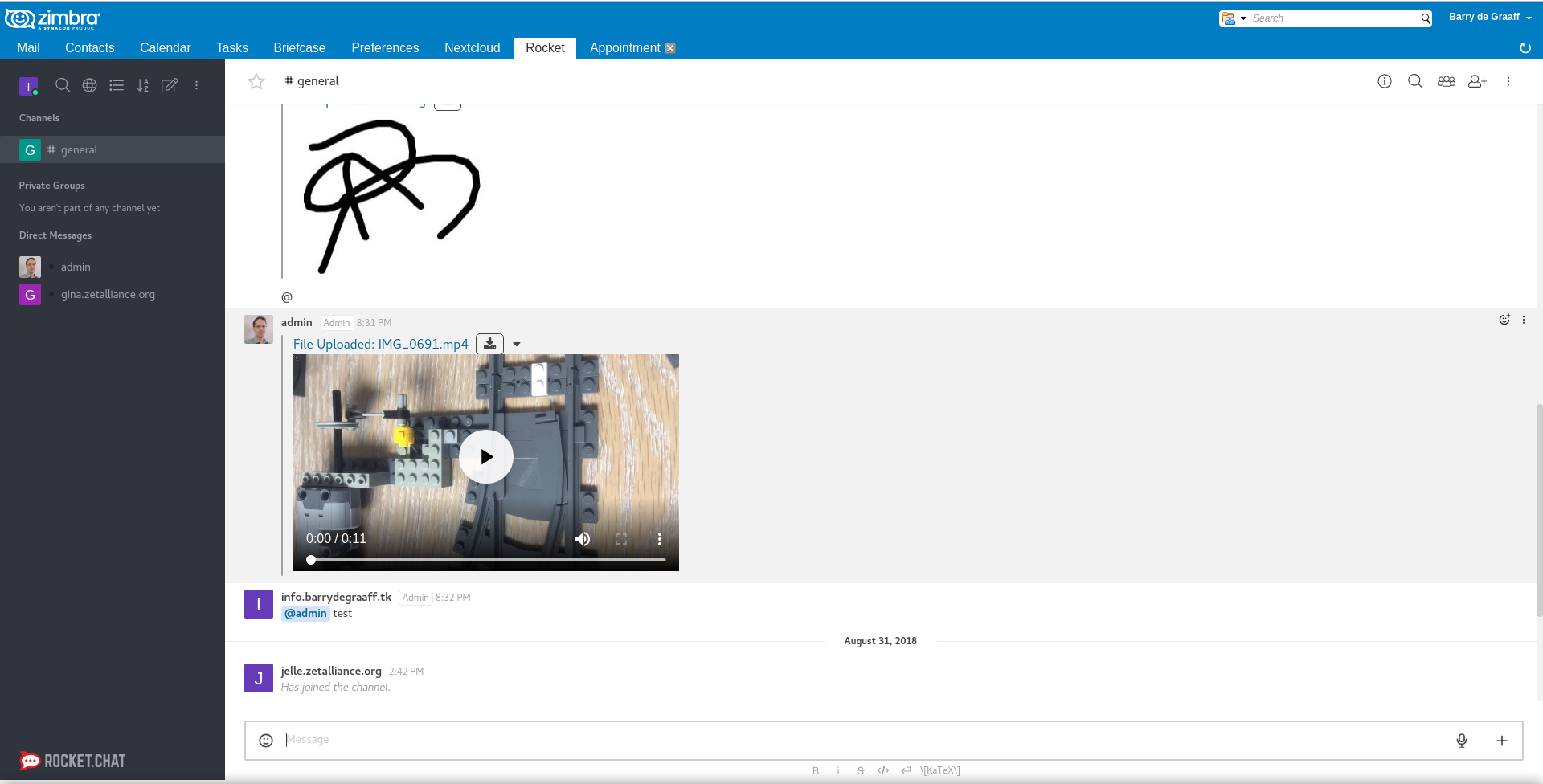In this Repository you will find a simple Zimlet to connect Zimbra Collaboration with Rocket Chat, and make an amazing integration with both inside the Zimbra Web Client, it will look like:
On this github we will not cover the installation of Rocket Chat, as it's perfectly explained here:
- https://rocket.chat/docs/installation/minimum-requirements
- https://www.digitalocean.com/community/tutorials/how-to-install-configure-and-deploy-rocket-chat-on-ubuntu-14-04
- https://www.howtoforge.com/tutorial/how-to-install-rocket-chat-with-nginx-on-ubuntu-16-04/
As of Rocket Chat version 2.1.0 you must set the CREATE_TOKENS_FOR_USERS environment variable for this integration to work. If you use snaps:
echo "CREATE_TOKENS_FOR_USERS=true" > /var/snap/rocketchat-server/common/create-tokens.env
sudo systemctl restart snap.rocketchat-server.rocketchat-server.service
Rocket Chat is designed to be deployed on Docker or Ubuntu Snap, which is really great:
- https://rocket.chat/docs/installation/docker-containers/
- https://rocket.chat/docs/installation/manual-installation/ubuntu/snaps/
This Zimlet can automatically log your users on to Rocket chat and even automatically create new users on Rocket chat. That way you only need to maintain the user accounts on Zimbra (full integration). Or you can maintain your Rocket accounts via LDAP or manually, but still log them on automatically (logon-only integration). Or you can just deploy only the Zimlet and let the user decide on the authentication (basic integration).
-
Full integration For this you need to set-up the Java server extension copy it from https://github.com/Zimbra-Community/zimbra-rocket/releases to /opt/zimbra/lib/ext/rocket/extension.jar then create a text file /opt/zimbra/lib/ext/rocket/config.properties with the contents:
adminuser=adminUsername adminpassword=adminPassword rocketurl=https://rocket.example.org loginurl=https://mail.example.org domaininusername=true
This adminuser and password you should have created when you first installed Rocket. The loginurl is the place where we point users to that have not yet authenticated. This can be your SSO login page or the Zimbra login page. The domaininusername property when set to true will create/logon users with their zimbra email address (replacing @ with a . ) i.e [email protected] will be user.example.com. When set to false, the username account would simply be "user". Don't forget zmmailboxdctl restart.
You must also configure Rocket chat like so:
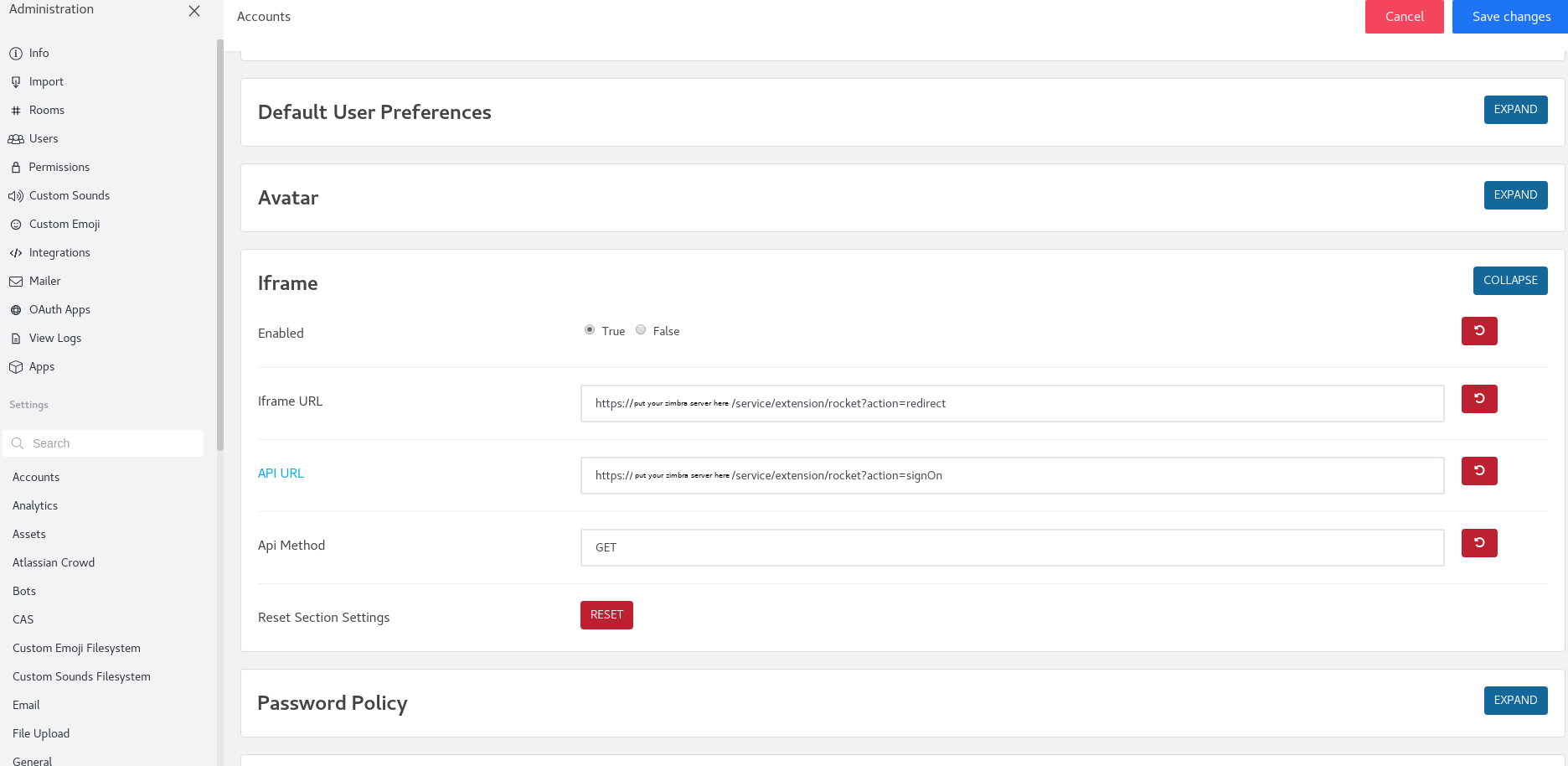 Be careful, as you can easily lock yourself out if something does not work. If you want more details check: https://github.com/Zimbra-Community/zimbra-rocket/wiki/Debugging
Be careful, as you can easily lock yourself out if something does not work. If you want more details check: https://github.com/Zimbra-Community/zimbra-rocket/wiki/Debugging
Also enable the full iframe integration like so:

You must also configure and deploy the Zimlet: Get a com_zimbra_rocket.zip (from Github releases) and as Zimbra user:
zmzimletctl deploy com_zimbra_rocket.zip
To configure the rocketurl in the Zimlet
zmzimletctl getConfigTemplate /opt/zimbra/zimlets-deployed/com_zimbra_rocket > /tmp/config_template.xml.tmp
Edit the /tmp/config_template.xml.tmp file according to your needs. Import the new configuration file by the running following command:
zmzimletctl configure /tmp/config_template.xml.tmp
-
Logon-only integration Follow the same steps as under
Full integrationexcept when configuring the Zimlet setcreateRocketAccounttofalse. The Zimlet assumes you created the account on Rocket chat. So if your Zimbra account is [email protected] a Rocket user account user.example.com should exist, unless you configured domaininusername in config.properties to true. In that, case the zimlet assumes account"user" exists. -
Basic integration In this case you may want to configure Rocket to use Zimbra LDAP. See steps below.
You must configure and deploy the Zimlet: Get a com_zimbra_rocket.zip (from Github releases) and as Zimbra user:
zmzimletctl deploy com_zimbra_rocket.zip
Configure the rocketurl in the Zimlet and set createRocketAccount to false
zmzimletctl getConfigTemplate /opt/zimbra/zimlets/com_zimbra_rocket > /tmp/config_template.xml.tmp
Edit the /tmp/config_template.xml.tmp file according to your needs. Import the new configuration file by the running following command:
zmzimletctl configure /tmp/config_template.xml.tmp
To check your configuration (config.properties) for typos and make sure you have no firewall issues, you can run the test tool on your Zimbra server. This will try and read your /opt/zimbra/lib/ext/rocket/config.properties and make a request to your Rocket server for debugging, without needing to dig through Zimbra's log files.
su zimbra
cd /tmp
wget https://github.com/Zimbra-Community/zimbra-rocket/raw/master/rocket-test/out/artifacts/rocket_test_jar/rocket-test.jar -O /tmp/rocket-test.jar
/opt/zimbra/common/lib/jvm/java/bin/java -jar /tmp/rocket-test.jar
It should report some adminAuthToken and report Configuration seems correct!. If not, check the printed stack traces for clues as to what is wrong. HTTP response code: 401 means username/password of admin is wrong.
In addition to this we also have https://github.com/Zimbra-Community/zimbra-rocket/wiki/Debugging for instructions on how to debug using curl.
Their appears to be an issue in meteor (the platform on which Rocket is build) that results in authentication tokens not being purged. This is a performance and security issue, as one user record can have thousands of valid tokens slowing down the db. To fix this configure a clean-up cron.
Create a file /usr/local/sbin/rocket-token-purge with contents:
#!/bin/bash
cd /snap/rocketchat-server/*/
./bin/mongo parties --eval 'db.users.update({}, { $set: { "services.resume.loginTokens": []}},{multi: true})'
run chmod +rx /usr/local/sbin/rocket-token-purge and put it in cron crontab -e like so:
2 3 1 * * /usr/local/sbin/rocket-token-purge
This will log people out of the Rocket.Chat app on their phone, so they need to re-enter their credentials.
See also: RocketChat/Rocket.Chat#6738
Configure Rocket Chat with the Zimbra LDAP is really easy, and you must follow the next steps:
Go to Administration and then LDAP, and enable the LDAP option, mark the option as shown, change the LDAP hostname with your Zimbra one (the Rocket and the Zimbra must have Network visibility)
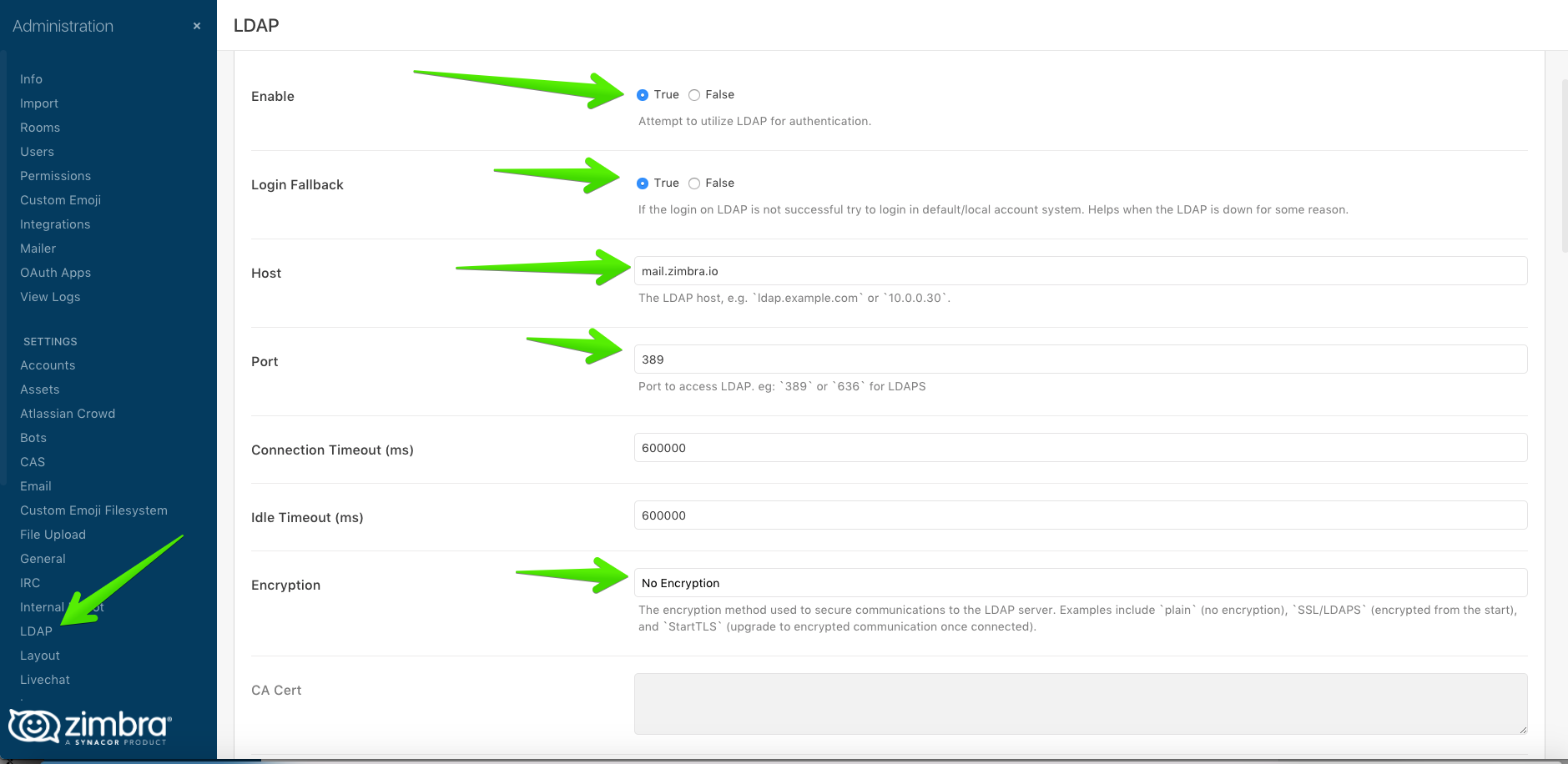
On the Domain Base add the next, change it with your domain: ou=people,dc=zimbra,dc=io
On the Domain Search User select the next: uid=zimbra,cn=admins,cn=zimbra
On the Domain Search Password add your LDAP Password, you can retrieve on the Zimbra server with zmlocalconfig -s zimbra_ldap_password
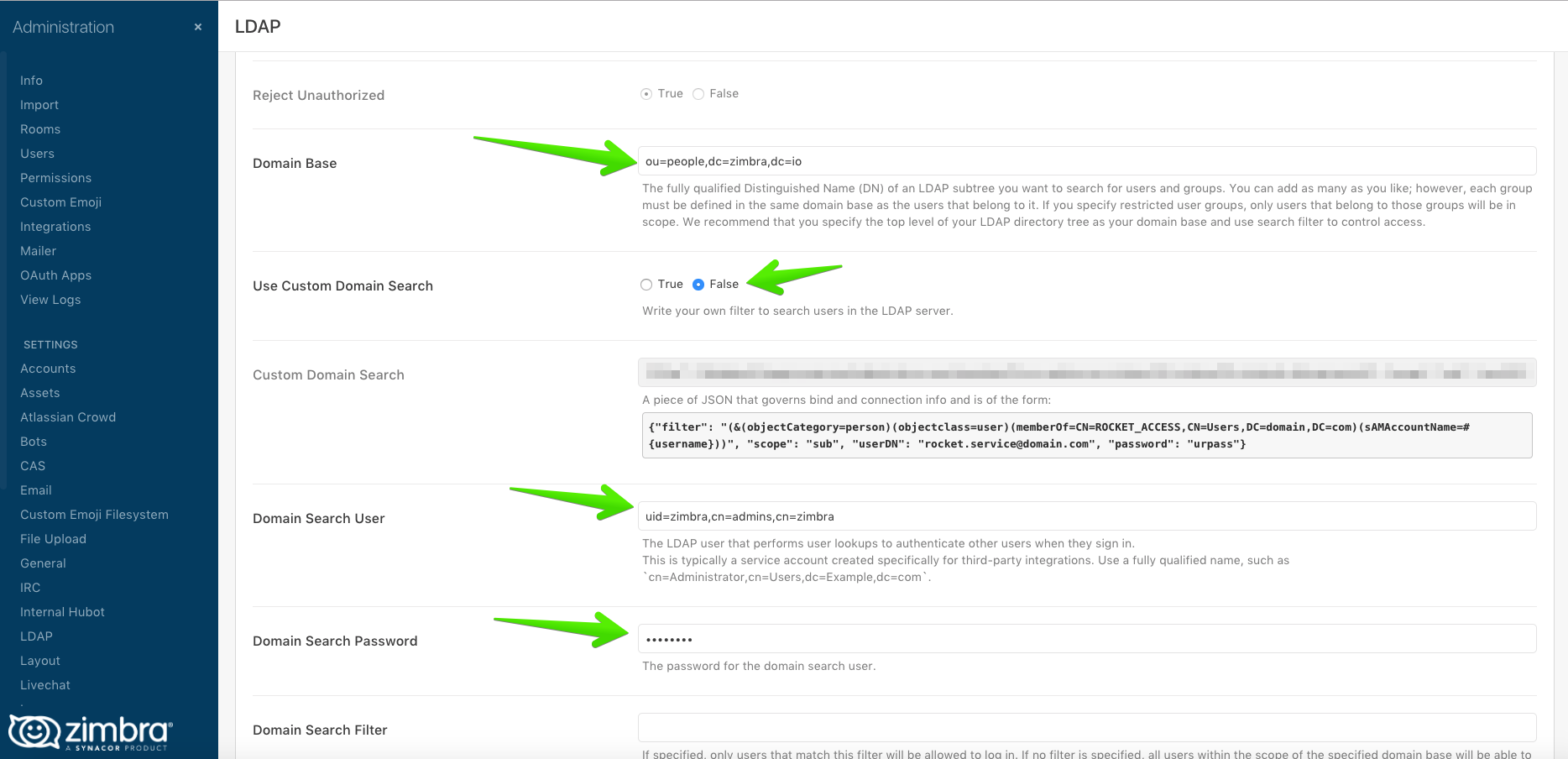
On the next fields, please fill them as shown:
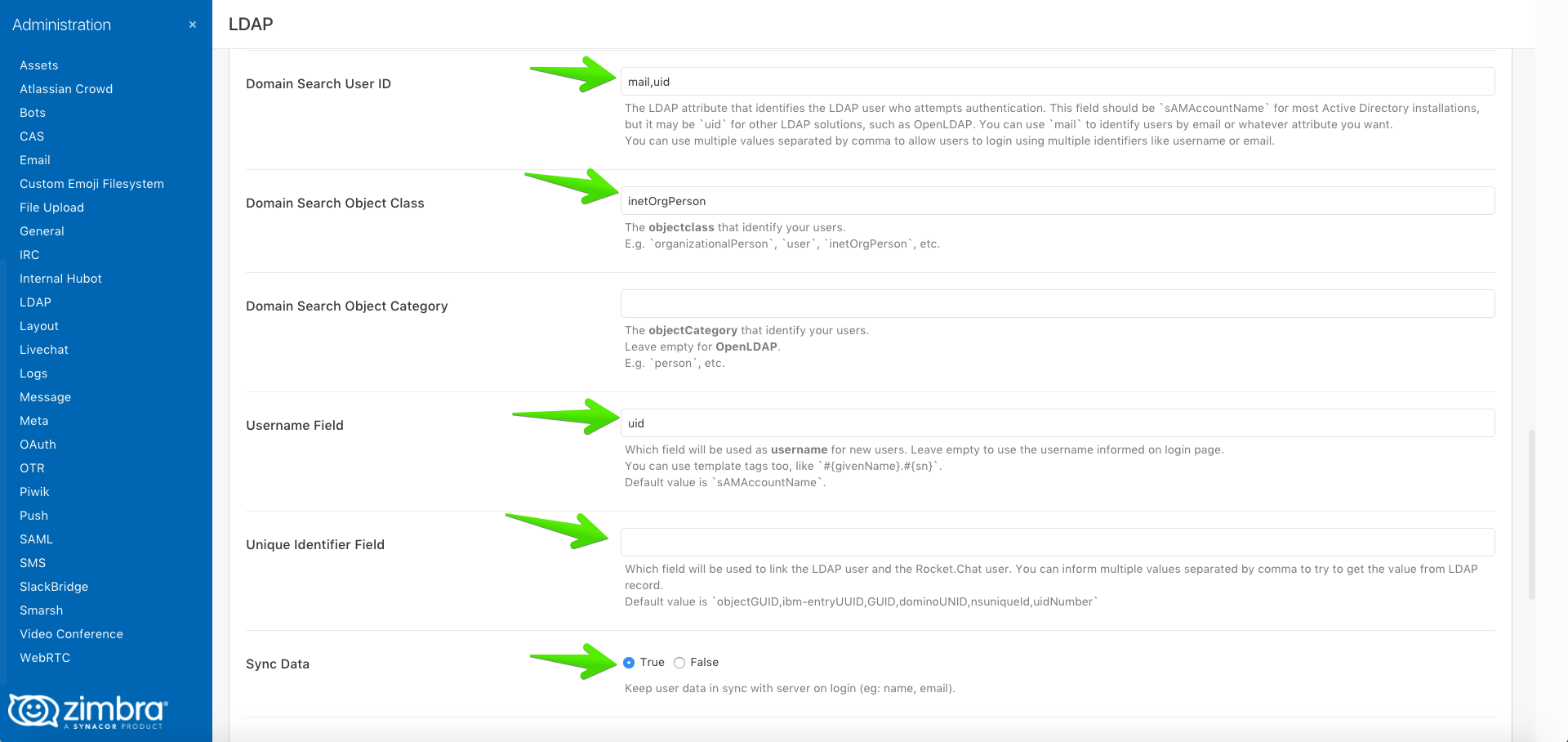
On the latest fields, fill them as shown and finally click on test, and Sync users, and Save
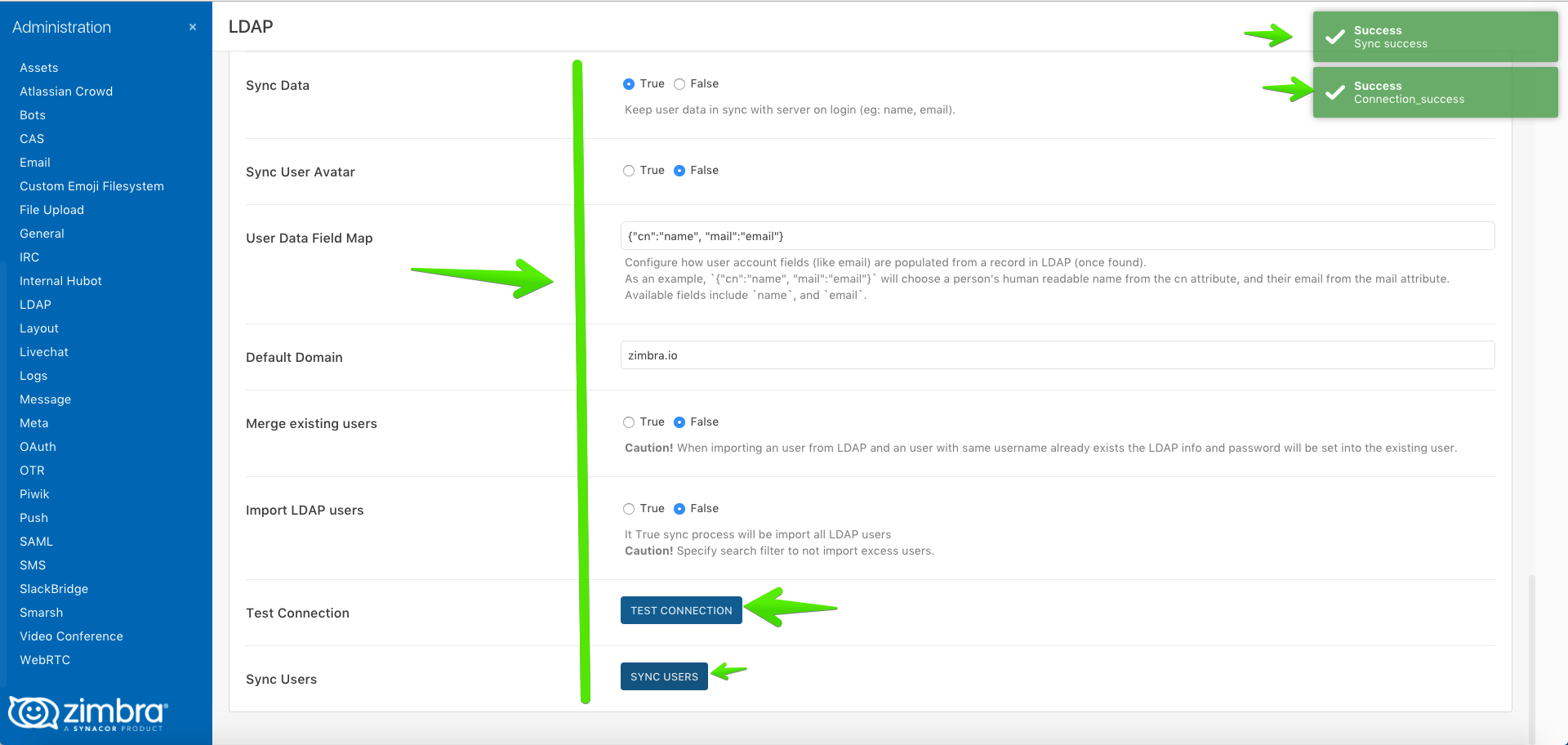
Zimbra Rocket doesn't end into an amazing look-a-like Slack experience, and you can even integrate your Zimbra Talk to make video calls between users, one-to-one and one-to-many, follow the next steps to enable it:
Go to Administration > Videoconference and add your Zimbra Talk FQDN, and the Zimbra Talk Chrome ID for the Share Screen Feature:
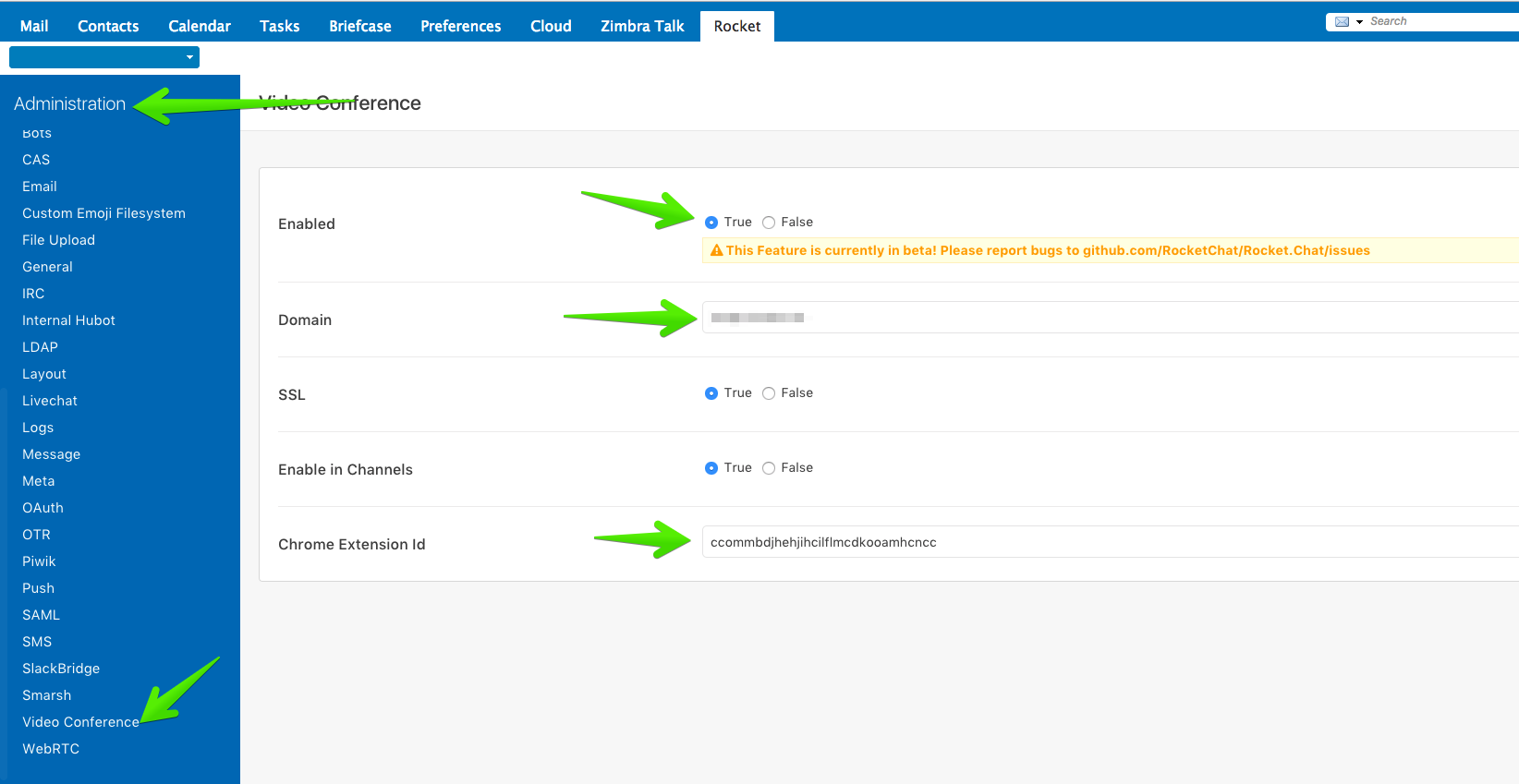
Then the users will be able to call each other, or to groups by using the camera icon:
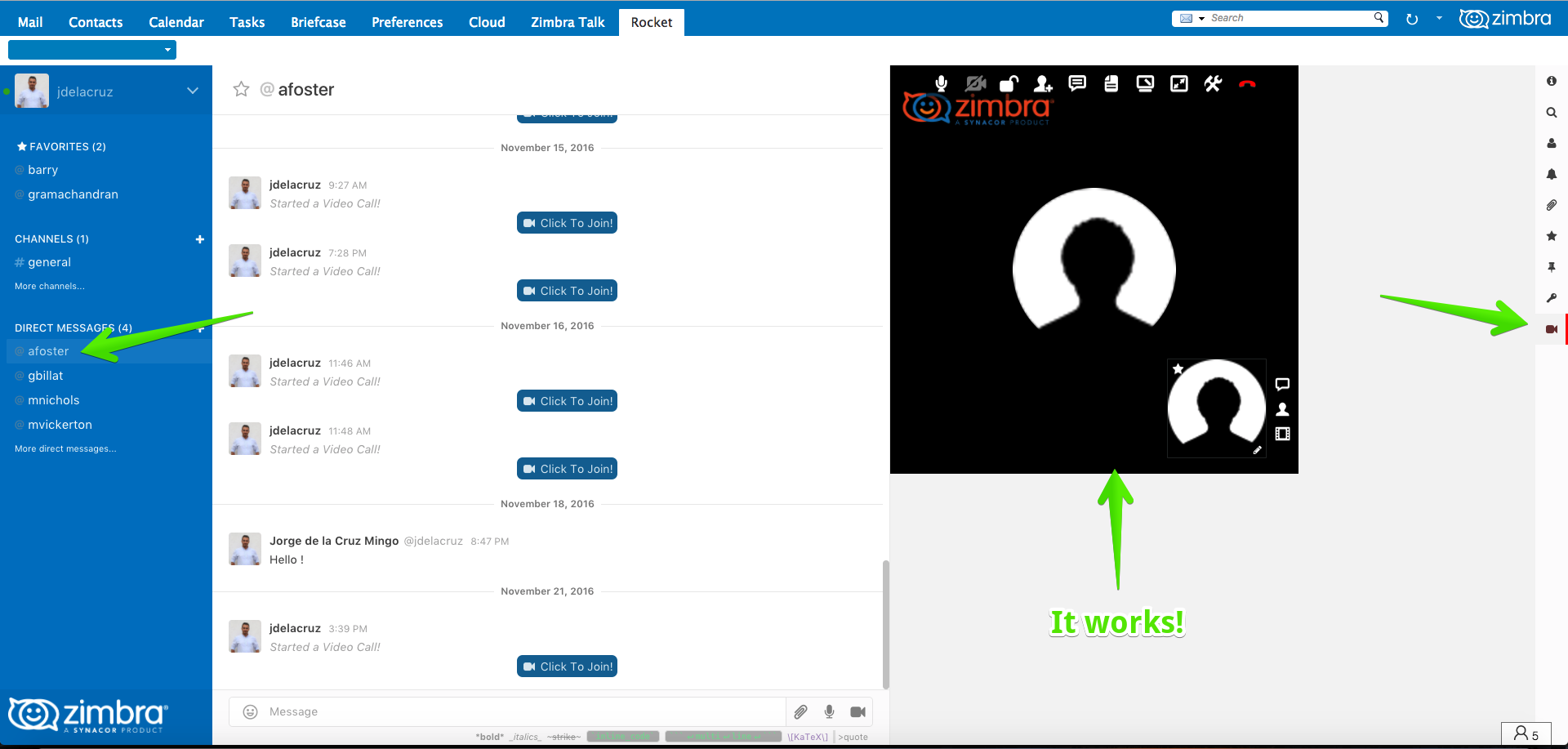
https://github.com/Zimbra-Community/zimbra-rocket/wiki/Debugging
========================================================================
The MIT License
Permission is hereby granted, free of charge, to any person obtaining a copy of this software and associated documentation files (the "Software"), to deal in the Software without restriction, including without limitation the rights to use, copy, modify, merge, publish, distribute, sublicense, and/or sell copies of the Software, and to permit persons to whom the Software is furnished to do so, subject to the following conditions:
The above copyright notice and this permission notice shall be included in all copies or substantial portions of the Software.
THE SOFTWARE IS PROVIDED "AS IS", WITHOUT WARRANTY OF ANY KIND, EXPRESS OR IMPLIED, INCLUDING BUT NOT LIMITED TO THE WARRANTIES OF MERCHANTABILITY, FITNESS FOR A PARTICULAR PURPOSE AND NONINFRINGEMENT. IN NO EVENT SHALL THE AUTHORS OR COPYRIGHT HOLDERS BE LIABLE FOR ANY CLAIM, DAMAGES OR OTHER LIABILITY, WHETHER IN AN ACTION OF CONTRACT, TORT OR OTHERWISE, ARISING FROM, OUT OF OR IN CONNECTION WITH THE SOFTWARE OR THE USE OR OTHER DEALINGS IN THE SOFTWARE.
